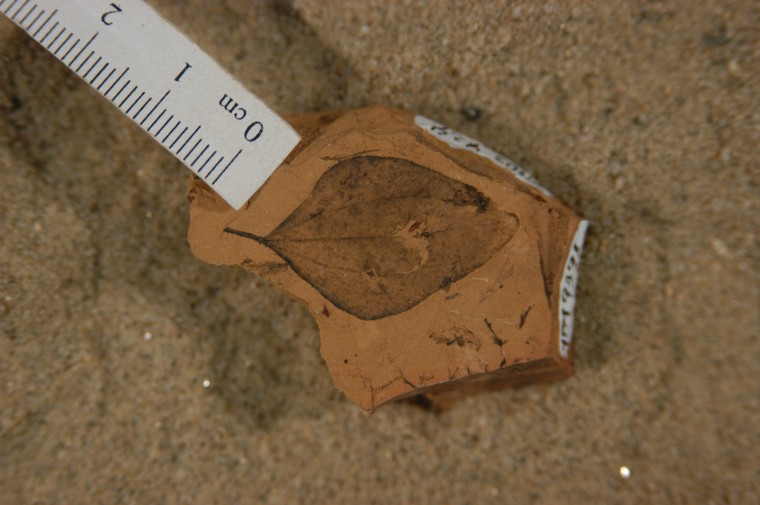Sixty-six million years ago, a meteorite struck the Earth with enough force that the ensuing environmental changes, including floods, earthquakes, variable temperatures and light-obscuring dust clouds, possibly wiped out dinosaurs and other pre-historic life. Scientists believe this opened a path for mammals, and ultimately humans, to evolve. A new study by Dana Royer, associate professor of earth and environmental sciences, and colleagues from the University of Arizona and the Denver Museum of Nature and Science suggests that the chaos in the wake of the space rock's impact changed the Earth's plant life as well. Deciduous plants survived and flourished to a…
On Sept. 22, President Michael Roth '78 and Joshua Boger '73, P'06, P'09, chair of the Board of Trustees, sent the following message to the Wesleyan community: To the Wesleyan community: As you may know, we have been considering the future role of Greek life at Wesleyan, and over the summer a great many Wesleyan alumni, students and faculty offered their views. Some have urged that we preserve the status quo; others have argued for the elimination of all exclusive social societies. (more…)
President Michael Roth discussed "The Future of Education" at the 92nd Street Y's Social Good Summit on Sept. 21. The event is the focus of his popular MOOC on the Coursera platform, which will be offered again starting in Nov., 2014. In his second appearance at the annual two-day festival of ideas, Roth discussed why education is still the best vehicle for social change, even while it has become more controversial then ever. Watch the video of his talk. "Education remains the most potent tool for changing the world, " he said. "And training teachers who can help students acquire the…
In 1961, the Communist government of the German Democratic Republic began constructing a 96-mile-long dividing wall in attempt to prevent Western “fascists” from entering East Germany and undermining the socialist state. The Berlin Wall, made of concrete and barbed wire, prevented emigration and more than 170 people were killed trying to cross or get around the wall. On Nov. 9, 1989, the head of the East German Communist party opened the checkpoint, allowing thousands of East and West Berlin residents to pass through. Elated residents, later known as "wallpeckers" used hammers and picks to break apart the wall. In 1990, East and West Germany reunified…
Five notable Wesleyan athletes and one long-time coach will be enshrined in the seventh class of the university’s Athletics Hall of Fame. In total, the Hall, established in 2008, now includes 37 individuals and 11 teams. Joining the Hall of Fame Oct. 17 will be: Joe Barry Morningstar '39, a three-sport standout (football, basketball and baseball) for whom Wesleyan's annual men's basketball outstanding player award is named; Cochrane Chase '54, a tremendous football and wrestling talent during his undergraduate career; Marion J. Stoj, M.D. '74, a high-scoring forward in men's soccer who earned All-America honors; Thomas Vincent Reifenheiser III '94,…
It was called "the war to end all wars." Causing the downfall of three major empires, and eclipsing all previous wars in its destruction, World War I changed the course of global history. And decades before television and sophisticated print advertising, it changed the way conflict was marketed to the American people. A new exhibit, Call to Action: American Posters in World War I, at the Davison Art Center, displays dramatic posters that recruited soldiers, celebrated shipbuilding, called women for war work and even urged homemakers to prepare alternative foods in support of the war effort. "The best illustrators of the day were…
The following message was sent to members of the Wesleyan community on Wednesday, Sept. 10: To the Wesleyan Community: We write to announce that the Beta Theta Pi residence at 184 High Street will be off-limits to all Wesleyan students effective Monday, Sept. 15, 2014. The students currently living there will be provided with alternative university housing. The decision to prohibit students from using the Beta house is based on the long history of incidents there. Most recently, during a party at the house a student fell from a third floor window and was seriously injured. We have lost confidence…
Uncover the hidden stories of East Asia’s religion and folklore at a new exhibit, "Not of This World," at the College of East Asian Studies' gallery. To inaugurate the new College of East Asian Studies, students curated this exhibition of the most compelling artworks from the college's collection. "Not Out of This World" is on display Sept. 10-Dec. 5 and features aesthetically pleasing pieces that reveal spiritual worlds filled with love, betrayal and faith. A ghost woman who searches for her husband, an immortal trapped in a peasant’s body, and a wheel that spins prayers are examples of the East Asian artwork displayed that weave the supernatural with mystical elements.…
The summer of 1964 saw thousands of young people — many from colleges and universities in the North - mobilize to register voters, educate citizens, and support other civil rights work in the Jim Crow South. What came to be known as "Freedom Summer" is credited with ending the isolation of states where racial repression and discrimination was largely ignored by news media and politicians, despite the the landmark Civil Rights Act passed that July. Wesleyan students joined the struggle. "Five Wesmen to Fight Voter Discrimination in Mississippi," said a front-page headline in the Argus. That May, Rev. Martin Luther King, Jr. had given…
This semester, the Shapiro Creative Writing Center is hosting three master classes taught by award-winning author and poet C.D. Wright. Master classes are open to all poetry-writing upperclassmen free of charge. Each class will last 2.5 hours and include one dinner. The classes will meet Sept. 23, Oct. 14 and Nov. 11, and the deadline to apply is Sept. 12. Wright is currently the I.J. Kapstein Professor of Literary Arts at Brown University where she teaches advanced poetry. Wright was born and raised in the Ozark Mountains of Arkansas. She has published over a dozen books, including Rising, Falling, Hovering, Like Something Flying Backwards: New and Selected…
Wesleyan nearly doubled its number of Teach for America participants this year over 2013, the national organization said. With 19 participants in the 2014 cohort, Wesleyan is tied for third among "small schools" (those with under 2,999 students) who send graduates into the corps. The Wesleyan alumni join the most diverse corps in Teach for America's 25-year-history, with one third of the members the first in their families to attend college, half identifying as people of color, and nearly half Pell Grant recipients as undergraduates. Teach For America works in partnership with communities to expand educational opportunity for children facing…
More than 20 student bands participated in THE MASH on Sept. 5. Inspired by Fete de la Musique, also known as World Music Day, the third-annual event highlighted the student music scene at Wesleyan and kicked off the year-long campus and community-wide Music & Public Life initiative. Bands performed concurrently on stages at Olin Library, the Butterfields, North College and at the base of Foss Hill. Bands and soloists included Jacob & The Masters, Quasimodal, David Stouck, Mixolydians, Andrew Hove, Slavei, all-caps LADD, Materiq, Trillion Dollar Boys Club (Butts Reunion Tour 2k14), jdv plus™, MFDP, Don Froot, Mazel Tones, Sam…









